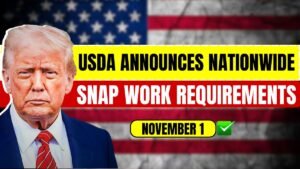USDA Announces Nationwide SNAP Work Requirements: The US government has announced a major change that will impact food assistance access for millions of low-income adults nationwide, effective November 1, 2025. The US Department of Agriculture (USDA) Food and Nutrition Service (FNS) has announced that the long-standing “work requirements” for the Supplemental Nutrition Assistance Program (SNAP) will now be fully enforced.
This policy has been suspended several times since the pandemic, but the government has now ended the grace period. This means that healthy adults without children (ABAWDs) must work at least 80 hours per month or participate in an approved training program, or they will lose SNAP benefits after three months.
What is SNAP and who will the new rules apply to?
SNAP, formerly known as the Food Stamp Program, is America’s largest food assistance program. Its purpose is to help low-income families and individuals purchase nutritious food.
But the new rules will now apply specifically to ABAWDs, i.e., healthy adults between the ages of 18 and 64 who have no dependent children.
These individuals will receive only three months of SNAP assistance unless they either:
- Work, train, or volunteer at least 80 hours per month
- Or fall under an approved exemption
Summary of the New Rules
| Main Rule | Requirement |
|---|---|
| Work/Training Hours | 80 hours per month |
| Time Limit | Benefits allowed for up to 3 months within 36 months |
| Applicable Age | 18 to 64 years (without dependents) |
| Effective Date | November 1, 2025 |
| Exceptions | Medical disability, pregnancy, caregivers, veterans, homeless individuals |
Why This Change Is Being Made
This policy is not entirely new. It is based on U.S. federal law 7 U.S.C. § 2015(o), which has been in effect for many years. The only difference is that now the USDA has ordered all states to fully comply with this rule.
The government granted temporary exemptions during the pandemic, when employment opportunities declined. But now that economic activity is returning to normal, the government wants SNAP recipients to fulfill their work responsibilities.
According to USDA officials, “This is not meant to punish anyone, but to empower them.”
They say this policy will help connect people with employment and training opportunities so they don’t rely on government assistance for long.
How many people will be affected and who will be exempt?
Experts estimate that this change could affect 700,000 to 900,000 adults across the United States. This number will depend on the state’s population, employment rates, and local policies.
Who will be exempt:
- Medically disabled individuals
- Pregnant women
- Those caring for a child or disabled family member
- Veterans and homeless individuals
- Students in an approved educational or training program
In addition, states have been granted some “discretionary exemptions,” but the USDA has limited these to 12% of the total affected population. This means states will now have to carefully consider granting exemptions.
Government’s Argument vs. Criticism
The USDA believes this is not a “cut,” but a “compliance reset.” A government spokesperson says, “We are not punishing anyone, but rather providing opportunities for people to connect with jobs.”
Supportive lawmakers say this policy will increase self-reliance and encourage participation in job training programs.
But critics have a different opinion.
According to the Center on Budget and Policy Priorities (CBPP), the real problem is not “willingness to work” but “the complexity of the system.”
CBPP researcher Elaine Waters says,
“Many ABAWDs already work part-time or gig jobs, but they may lose benefits simply because of documentation or lack of verification.”
This can be even more difficult in rural areas, where job opportunities are scarce and transportation is not readily available. The 80-hour rule may prove impractical for many.
How are states preparing?
Because each state administers SNAP on its own, the level of preparedness varies.
While some states, such as Florida and Texas, are fully prepared, states like Oregon, Michigan, and Pennsylvania have warned that funding and staffing shortages could lead to delays in the initial months.
State-by-State Status (as of October 2025):
| State | Status |
|---|---|
| California | Training ongoing, exemption request pending |
| Florida | Fully ready from November 1 |
| Michigan | Staff shortage, temporary delays possible |
| Oregon | Partial exemption in rural areas |
| Pennsylvania | Implementation slowed due to funding instability |
The USDA has clarified that SNAP is a mandatory spending program, meaning it will continue even during a temporary government shutdown or budget disputes. However, if the budget impasse persists until mid-November, administrative delays may occur.
What SNAP Beneficiaries Need to Know
If you are currently receiving SNAP benefits and fall into the ABAWD category, here are some important things to know:
- Pre-Notice:
- You will receive written notice before your benefits end.
- Three-Month Limit:
- If you fail to meet the work or training requirements for three consecutive months, your benefits may be temporarily discontinued.
- Steps to Re-Eligibility:
You may become eligible again if you:- Work or volunteer 80 hours per month
- Enroll in a valid training program
- Or submit a valid health/care-related exemption
- Maintain Contact:
- Stay in regular contact with your state’s SNAP office and submit the required documents on time each month.
State Responsibilities
According to USDA directives, starting November 1, 2025, every state will be required to:
- Maintain monthly records of each beneficiary’s working hours and activities
- Provide prior notice before terminating any benefits
- Send quarterly participation and exemption reports to USDA
If a state does not comply with these standards, it may face Quality Control (QC) penalties or corrective action orders.
Accountability vs. Compassion – A Test of the Real Balance
The USDA claims this new order is “modernizing access.” “Countability” is an attempt to modernize accountability. But the question is, will sensitivity be lost in the name of accountability?
In urban states, where employment centers and internet facilities are readily available, this policy may be easily implemented. But in rural or small towns, where there are neither job opportunities nor training institutions, the 80-hour standard may prove to be a wall rather than a bridge.
A senior FNS advisor said,
“We don’t want to take away food, we just want to ensure that both assistance and opportunity go hand in hand.”
The Way Forward
It will be interesting to see how much this policy changes America’s food assistance system in the coming months.
Will it help people find employment, or will millions face food shortages?
While the government is talking about “balance,” human rights and poverty alleviation organizations warn that if flexibility is not shown, this policy could further exacerbate the problem of hunger.
But one thing is certain—the face of the SNAP system will change starting November 1, 2025, and this change will have a profound impact on American social policy in the future.
Conclusion
Debate is raging over SNAP’s new work requirements. The government is calling it an “empowerment measure,” while critics are calling it a “rigidity in aid.”
Ultimately, success will depend on how sensitively and pragmatically state governments implement this change.
Because the real challenge isn’t making people work—it’s ensuring that every American citizen has enough food to eat. I get food and also the right opportunity to become self-reliant.
FAQs:
Q. When will the new SNAP work rules take effect?
A. The new rules will be fully enforced starting November 1, 2025.
Q. Who will be affected by the change?
A. The policy applies to Able-Bodied Adults Without Dependents (ABAWDs) — adults aged 18–64 without children.
Q. What is the main requirement?
A. ABAWDs must work, train, or volunteer at least 80 hours per month to remain eligible.

















